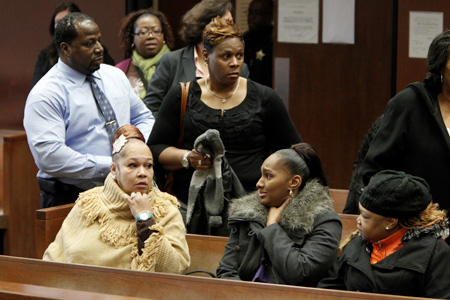
Shalga Hightower, mother of murder victim Iofemi Hightower, seated left, talks with family members as James Harvey, standing left, father of murder victim, Dashon Harvey, and his wife Mary enter superior court for the sentencing of Gerardo Gomez, the last defendant convicted in the Newark schoolyard killings Jan. 9, in Newark, N.J. (AP Photo/The Star-Ledger, Robert Sciarrino)
by David Porter
Associated Press Writer
NEWARK, N.J. (AP) — The last of six defendants convicted in a notorious schoolyard triple murder was sentenced Wednesday to 195 years in prison, closing one chapter on a crime whose savagery made national headlines and spurred numerous anti-crime measures in New Jersey’s largest city.
What happened behind the Mount Vernon School on the night of Aug. 4, 2007, was “evil incarnate,” state Superior Court Judge Michael L. Ravin told the gallery as he sentenced Gerardo Gomez to three consecutive terms of 60 years each on three murder counts and 15 more years on an attempted murder count.
Gomez, who turned 15 on the night of the murders, was one of six men and boys with ties to the MS-13 street gang who pleaded guilty to or was convicted of the crimes. Four other defendants are serving multiple consecutive life sentences, and a fifth received 30 years in exchange for his testimony.
In all, the six defendants are serving sentences totaling 1,082 years.
“This is a very important day to remember what was taken from us,” acting Essex County Prosecutor Carolyn Murray said. “These were good kids who were headed to bright futures, young people who proved you can grow up in Newark and go on to do great things for our community.”
The victims — Iofemi Hightower, Terrance “T.J.” Aeriel, Dashon Harvey and a fourth friend who survived the attack — were enrolled or about to enroll at Delaware State University. The fourth victim, who testified for the prosecution, isn’t being named by The Associated Press because of sexual assault charges against two defendants.
All four attended high school in Newark and were active in marching bands. Hightower, 20, was working two jobs to fund her goal of attending college, where she hoped to major in business and sociology; Harvey, also 20, was a social work major who fancied himself a fashion maven; 18-year-old Aeriel was already an ordained minister.
Soon after the four gathered at the playground to drink sodas and listen to music, they were set upon by the six defendants, who forced them to lie on the pavement and robbed them at gunpoint.
Gomez and three others then led Hightower, Harvey and Aeriel down a flight of stairs where they were forced to kneel against a wall before each was shot in the head. Before her death, Hightower was slashed repeatedly on the head and arms with a machete. The fourth victim was stabbed and shot and required multiple surgeries.
“We can say unequivocally that this is the worst homicide we have seen,” assistant prosecutor Romesh Sukhdeo told the judge.
The victims’ backgrounds juxtaposed against the barbarity of the attack sent shockwaves through Newark, a city where homicides had topped 100 the year before for the first time since the 1990s.
The outrage led to action: Among other measures taken after the killings, Newark jump-started efforts to install surveillance cameras in dangerous neighborhoods, instituted penalties for gun owners who fail to report lost or stolen weapons and set up an agreement to give New Jersey municipalities access to a federal gun-tracing database.
By the end of 2008, Newark’s homicide rate had dropped by nearly 40 percent from two years earlier, but it has risen since then. Ninety people were killed in the city last year, according to the county prosecutor’s office.
During Gomez’s trial, defense attorney Michael Robbins sought to portray him as a bystander at the playground who was too afraid of the older gang members to flee.
“The horror here was conceived in minds much older than his,” Robbins told the judge. The murders “didn’t occur at his direction or his request. He didn’t wield that .357 or that machete.”
Shalga Hightower, one of two family members to speak in court, addressed Gomez, who didn’t turn to look at her.
“I don’t hate you, Gerardo. I hate what you took part in and what took my daughter from me and what you stand for,” she said. “But I stand here as a survivor, not a victim.”
Gomez’s conviction isn’t the final legal proceeding stemming from the killings. A lawsuit filed by the victims’ families, accusing the school district of negligence for leaving the playground open at night when it was a known gang hangout, is in jury selection this week.